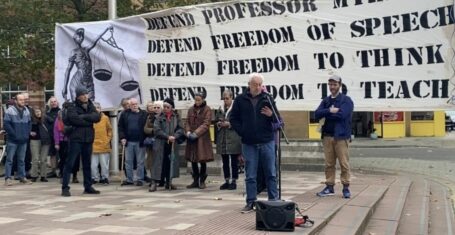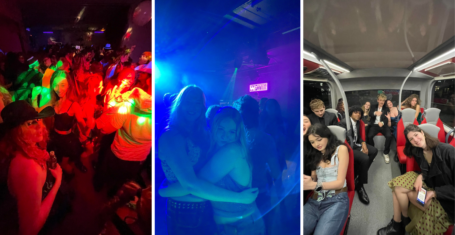
How can Bristol SU connect better with its students?
The Students’ Union is there to represent us
The headline says it all: "Strippers at AGM- 'Blatantly sexist'". The year was 1998 and after five years of poor attendance at the Annual General Meeting, desperate sabbatical officers hired a male and female stripper to dance for students in a bid to hit quoracy.
The result? Eight hundred students turned up for the best attended AGM in fifteen years, despite predictable criticism from the Socialist Worker Student Society. Sabbatical officers rejoiced at the "Huge turnout" with one of them telling Epigram that "Students need to remember what it's there for- it's what they want it to be".
Twenty years on and the problems of discontent, detachment and disillusion at Bristol SU have returned. In 2018, the Annual Members' Meeting (AMM) once again failed to hit its (low) level of quoracy. Many students simply feel no attachment or connection to their Students' Union. How can such apathy be countenanced, without resorting, if possible, to copious amounts of naked stripper flesh?
The Epigram headline from 1998 in dark pre-Tab days
It is of course all too easy for cynics and critics to carp and condemn from the sidelines. Student hacks have certainly indulged in this habit for years, merrily sticking the boot in whenever there has been an administrative cock up like the 2013 Union ball or a dubious decision by the supposedly careerist bureaucrats who run it.
Yet in a bid to show that we parasitic student journalists can also put our neck on the line, I propose three areas in which the SU could be doing better to revive its reputation and cultivate more support from the student body: improved representation, more accountability and better communication.
The first point is by far the most urgent. Judging from anecdotal evidence, most Bristol students simply do not feel that their Union represents them. Consequently, they do not participate in SU activities, ballots or campaigns, creating a cycle where most students go unheard and a minority of the vocal or the privileged exercise great influence. Turnout in this year's elections was only 25.09% and that is the cumulative total of sabb, course/faculty reps and chairs of networks- for which many students will have voted only because a friend was running.
International students are some of the least represented at Bristol
The SU ought therefore to prioritise reaching out to those members traditionally least involved in it- namely first years and international students. By locking in the former, the Union will build lasting links quicker and enable better support to those adjusting to their new city. By appealing to the latter, the Union will tap into an under-represented constituency likely to grow in size and importance, given the stated goal of the University to increase its overseas contingent.
Despite what some commentators argue, representation does not have to be a zero sum game in which the SU is forced to choose between liberation groups and the bulk of Bristol students who happen to not fall into one of categories. The SU can and should look at supporting both traditionally marginalised persons AND the many other students who attend this University and fund its SU as well. Sexual harassment and male mental health; transphobia and financial disadvantage- there is no reason why the SU cannot broaden its focus and by extension its appeal to Bristol students.
Secondly, there is clearly an urgent need to foster a culture of accountability. As the outgoing Undergraduate Education Officer pointed out in the last Student Council meeting of 2017-18, not a single question was asked by attendees of any of the six sabbatical officers. Candidates can, and sometimes do, make promises that they know they will never be able to deliver because the likelihood they will be held to account on this is so slim. Moreover the fact that most sabbs are elected after finishing third year mean most of their peers/voters leave Bristol and never keep tabs on whether a manifesto is actually implemented.
Some students object to the location of the SU offices away from the ASS
The fact that only one of the two Student Council meetings in 2017/18 were quorate- despite halving the number in 2016/17- suggests that structural tinkering is not enough; there needs to be a cultural shift. Undoubtedly students can and should be doing more on this. Numerous sports captains, JCR Presidents and society reps amongst others frequently fail to perform their duties because they know they will not be held to account by students, disinterested and disinclined to educate themselves on how best to improve the institutions at Bristol.
Yet more can and should be expected of sabbatical officers, who are paid £19,000 a year and ought to take a lead on this. In terms of accountability, some sabbatical roles benefit from being more student facing: the Sports Officer, for instance, usually knows most of the key players in the sports world and can be alerted to issues of concern whilst socialising on Wednesday evenings. Others could do more to replicate this for their portfolios – the Postgraduate and Undergraduate Education Officers could, for instance, add every course rep at the start of each academic year on their SU Facebook accounts.
A monthly open meeting, similar to MPs surgeries or personal tutor discussions, could flag up issues early and prevent disasters such as the landslide SU defeat over hall changes in February. At best, it could open the SU up to new ideas and new faces, to people who might not feel comfortable in more public meetings. At worst, it would offer an authoritative rejoinder to those who say 'But you never listen to students'. Such steps would help send out the message that the Union is indeed the voice of university students towards management and not the voice of management to university students.
The 2017-18 team of sabbatical officers
Finally, communication is key to the future success of the SU. At times the SU has been woefully neglectful on this issue, most notably after three sudden and tragic student deaths when it took a full week for the Union to issue a statement that clumsily began "We have lost too many students this year." Use of informal networks, like the popular Bristruths page, could help drum up awareness of forthcoming events like AMM, with a ‘reaching out’ exercise useful in showing an awareness of where students get their news and in making those outside the SU bubble feel appreciated.
Such suggestions are of course, just one perspective on where the SU could be doing better. There are many areas the Union excels in, with the Richmond Building full of excellent, hardworking staff from Chief Executive Sam Budd to the charming 'Democracy Ann' and the long suffering comms team through to the porters, bar staff and cleaners.
But it is clear more can still be done to help the SU connect better with its students and put itself on a more secure and more lasting basis for the future. Improved representation, more accountability and better communication are all ways of doing this. Failing that- there's always the strippers.









































